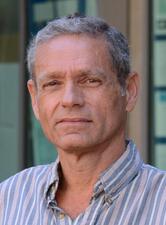Francisco Zaera, a UCR distinguished professor of chemistry, has received a $500,000 grant from the United States Department of Energy, or DOE, to research the optimization of catalytic processes through environmentally friendly alternatives.
Zaera is a physical chemist specializing in catalysts, which are used in a variety of industrial processes to speed up reactions. In addition to speeding up reactions, catalysts must be selective, that is, able to promote the desirable chemical reactions while avoiding side conversions.
The type of reactions Zaera is focusing on in this project — oxidation reactions — occur when there is a transfer of electrons between substances. Oxidation-reduction reactions are present throughout nature, including in photosynthesis, respiration, and rusting, where the oxidant is the oxygen in air. However, most reactions in the industrial world, such as those used to produce pharmaceuticals, require the use of hydrogen peroxide. Although hydrogen peroxide seems widely available, it is produced from nonrenewable resources such as methane or natural gas. Switching to oxidation processes that use air is highly desirable.
The grant, funded through the DOE’s Basic Energy Sciences program, will fund Zaera’s research on the use of gold-based catalysts in selective oxidations that use naturally occurring oxygen instead of hydrogen peroxide.
One advantage of using gold is it is active at lower temperatures compared to other active metals, needing less energy to be heated. Other metals have been used in the past such as platinum, which is expensive, as well as rhodium and palladium, often found in automobile catalytic converters. Recent Japanese research has found that gold is highly active if it is in the form of small particles, a few nanometers in size, which also allows for the use of small quantities.
“The Department of Energy is interested in finding ways of saving energy because generating energy is one way we pollute our environment,” Zaera said.
Zaera’s goal is to optimize the selective oxidation of renewable bio-materials to yield valuable molecules that can be used in the production of polymers, cosmetics, health care products, and food, for instance.
“The Department of Energy is interested in alternative ways of generating energy,” he said. “But they are also interested in minimizing the use of energy and the impact of energy in the environment. So that's where this project fits in.”
Another beneficial aspect of his research is selectivity, or the ratio of desired product to undesired product. The importance of selectivity lies in improving yields and reducing waste by limiting the amount of unwanted and potentially toxic byproducts. Improved selectivity can also reduce the time and cost to separate and purify the desired product from the undesired byproduct.
This research could lead to the creation of ingredients that are better for the planet and environment.
